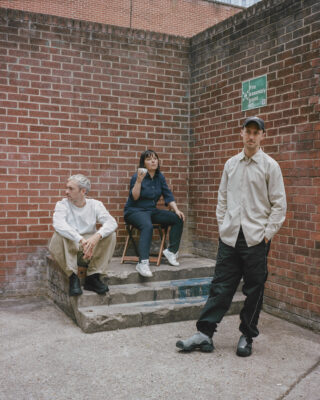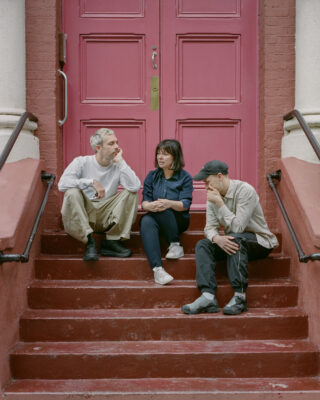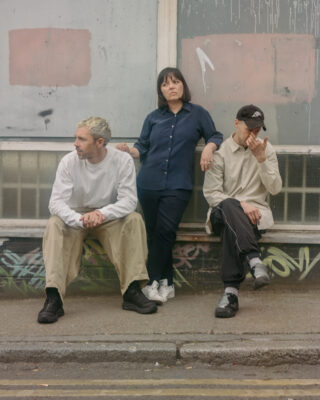Post-rock collagists Moin: “Ambiguity is something that we really love playing with”
Trying to pin down the elusive post-rock collagists a decade into their shapeshifting collaboration

Trying to pin down the elusive post-rock collagists a decade into their shapeshifting collaboration
“There is no modus operandi that is fixed,” states Valentina Magaletti from her Hackney kitchen, flanked by Moin bandmates Joe Andrews and Tom Halstead. It is a mantra that repeats throughout our conversation; much like their music, Moin are a hard bunch to pin down in person.
“That is the magic of the project, how unsettling it is,” she continues. “To put a Moin record on, a listener thinks, ‘Oh I know what this is going to be, it sounds like post-rock or post-hardcore and something I may have listened to in the ’90s’, but then after a while it enters new territory and you think ‘Hang on a minute’ – it takes you somewhere else.”
The post-whatever grooves of Moin began as a spin-off from Joe and Tom’s project Raime, all the way back in 2012 when they were joined by prolific percussionist and composer Valentina – whose CV includes Vanishing Twin and Holy Tongue as well as collaborations with Floating Points and Zongamin to name but a few.
“We all used to end up at the same parties and sometimes those parties would finish with live music in the middle of the room, so that’s how they knew I was playing the drums and I got summoned,” says Valentina. Joe’s still laughing at the word ‘summoned’ when he tells me: “The fact that people interpret Moin the way they want to is the entire point of art, and that’s how and why people are drawn to it. If you start to try and shut it down then it becomes meaningless.”
The trio combine their particular brand of industrial rock with samples and electronic manipulation, meaning they are often described as a musical collage. “I’m down with that term,” says Joe. “The production process is informed by collage, because collage is all about juxtaposition and trying to find something new out of putting two different things together. The dynamism that comes out of that process is actually where we get our energy from, because we are all super fans of loads of different types of music. Putting together different entities is part of the interest, so I think collage is something to be welcomed.”
Like their last full-length (the remarkable 2022 album Paste), Moin’s new EP Clocked Off captures the band’s assembly of ideas to startling effect, the experimental electronic palette of past projects like Raime evolving into something altogether new. “Moin is [about] trying to get the vitality and immediacy,” says Tom, “just get it down and if it feels right emotionally and the sentiment resonates in the right way then that’s good, move on to the next one. Where we use sampling, these shards of sounds that we don’t even know the source of anymore, they seem like they are meant to be there. It might seem incongruous having this electronic odd sound but it feels natural in the melange.”
Even without a traditional singer, the band slowly unfurl a distinctive, often darkly humorous identity the more you listen to their work. A lot of the time this is communicated through spoken word samples. “The spoken word stuff is sourced and we’re very careful about that,” explains Joe. “Ultimately it has to have a very clear quality whilst being ambiguous; we want to instil that notion of having a position of a singer within a band in the traditional sense but not commit to it, either in terms of a personality or what it’s delivering. That ambiguity is something that we really love playing with, as it gives it a magic – it gives it a feeling of, ‘I know this means something but I am not sure what it is.’”
“The starting point is always the drums,” says Tom, nodding respectfully to Valentina. “Valentina’s part is hugely fundamental.” The drummer laughs before explaining why Moin is such an escape for her.
“Well, I would say that it’s the most gravity-blast, testosterone way of playing, which is very humorous from my point of view,” she says. “To play rock music is a completely different approach for me, but I keep it very experimental. The main difference between this and my other work is I don’t have that powerful way of playing elsewhere. We have a BPM and we go for it, we have a grid and we try to defeat the grid.” I wonder if Valentina brings any of her solo composition processes to the studio. “I do yes, I also listen to tribal percussion stuff; I love free jazz too, of course, and I love experimenting with materials – I use rubber, wood and metal and whatnot. We try to do all sorts in Moin too, we were in the studio recently with brushes, whatever it takes for the sonic palette to work.”
It is that fluid approach that the three-piece keep returning to. “The relationship between the live recording and the manipulation in the computer is interesting,” Joe says. “We’re now at the stage where you’re essentially trying to blur the lines; you’re not trying to uphold the original integrity of the electronic and the acoustic in a singular way, you don’t always want the drum kit to be a drum kit and you don’t always want the guitar to be a guitar. Whilst in theory that creates something that maybe you wouldn’t want, actually you can get to a place that is still emotionally resonant.”
Tom is keen to stress that although they relish the computer re-edit, they try to rely on speed and instinct. “A track can be burrowed into your head so much you end up hating it and then you never put it out, you go back six months later and think actually this is alright, so you don’t give it time to breathe as you have been immersed in it too much, we want to work differently.”


After ten years of collaborating together, Moin’s processes and even the band members themselves have changed significantly. “I think the main difference for us is the speed and labour, like Tom said,” picks up Joe. “We are much more about trying to value what happens in a short period of time – we used to take forever.”
“We were slaves – they had like 300 versions of the same thing!” says Valentina. “The pandemic happened and they decided to choose life instead.” Joe couldn’t agree more. “Technology gives you the option to keep going back, right? As long as your hard drive is working and your software licence is up to date you can always go back to it. So we’ve been trying to impose limitations and bring life to the music – as Val says, always choose life.”
The warm familiarity of sounds on a Moin record could be understood as taking the listener on a nostalgia trip, but Joe comes at it from a different angle. “I think the nostalgia thing is really fascinating,” he says, “because if you were to look at house music, which we’re big fans of, it has a specific set of instruments that are used in the main. Obviously there are masses of variants, but a classic house sound is not necessarily determined as nostalgic, even though its feelings and textures are often repeated. With the lineage of rock music, to me the repetition of those traits that make it feel nostalgic don’t feel nostalgic to me – they just feel like these are the tropes from the genres that exist because they are powerful and work well. I’m not rallying against nostalgia – just how we interpret the elements.”
“You make a record in 2023, so you are informed by all the records from 10, 20, 30 years ago,” concludes Valentina. “This is natural, it’s nostalgia plus – plus, plus.”